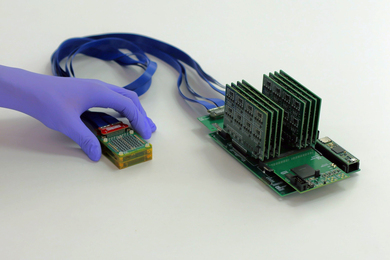The appointments to endowed professorships of two faculty members in the Department of Economics has been announced by Provost Mark S. Wrighton.
- Peter Temin has been selected to be the next Elisha Gray II Professor. Professor Temin, head of the department, is an authority on American economic and industrial history.
- Paul R. Krugman has been selected to be the next Class of 1941 Professor. Professor Krugman has made seminal contributions both to the microeconomics and macroeconomics of international relations.
The Elisha Gray II Professorship was established by Mr. and Mrs. Elisha "Bud" Gray in celebration of Mr. Gray's 50th class reunion. He earned an SB in management in 1928 and later joined Whirlpool Corporation, where he became president and chairman of the board. Mr. Gray continues to maintain close ties to his alma mater.
The Class of 1941 Professorship was established by the class to celebrate its 40th reunion. Among the members of the class are David S. Saxon, Honorary Chairman of the MIT Corporation, and Carl M. Mueller, Joseph G. Gavin Jr. and D. Reid Weedon Jr., all Life Members of the MIT Corporation.
Dr. Temin, head of the Department of Economics since 1990, has done research on a range of subjects, including the market structure of the US pharmaceutical and telecommunications industries, the economic impact of slavery on the antebellum and postbellum South, and business cycles, panics and depressions.
He received a BA at Swarthmore College in 1959 and the PhD in economics from MIT in 1964. He began his teaching career in 1965 as assistant professor of industrial history at the Sloan School of Management. He moved to the Department of Economics in 1967 as associate professor of economic history and was promoted to professor of economics in 1970.
He is a member of the American Economic Association, the Economic History Association and the Economic History Society of the United Kingdom. He is a research associate of the National Bureau of Economic Research and a Fellow of the American Academy of Arts and Sciences.
Professor Krugman has been a leader in applying recent insights in the theory of industrial organization to international trade. These new models explain how the same goods can be both exported and imported by a single country, how trade is affected by the market power of firms, and why similar countries trade with each other. He has also made many contributions to the theory of currency crises and exchange rate changes.
In 1991 he received the John Bates Clark Medal from the American Economic Association as the economist under 40 who has made the most important contributions to economics.
Professor Krugman received a BA degree from Yale University in 1974 and a PhD from MIT in 1977. He has been a member of the faculty since 1979 and a full professor since 1984.
He is a research associate of the National Bureau of Economic Research, an advisory board member of the Institute of International Economics, a Fellow of the Econometric Society and of the American Academy of Arts and Sciences and a member of the Group of Thirty.
A version of this article appeared in the May 26, 1993 issue of MIT Tech Talk (Volume 37, Number 34).





